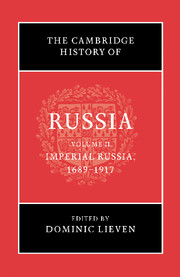Book contents
- Frontmatter
- Introduction
- Part I Empire
- Part II Culture, Ideas, Identities
- Part III Non-Russian Nationalities
- 8 Ukrainians and Poles
- 9 The Jews
- 10 Islam in the Russian Empire
- Part IV Russian Society, Law and Economy
- Part V Government
- Part VI Foreign Policy and the Armed Forces
- Part VII Reform, War and Revolution
- Bibliography
- Index
- Map 5. The Russian Empire (1913). From Archie Brown, Michael Kaser, and G. S. Smith (eds.) Cambridge Encyclopedia of Russia 1982.">
- Plate Section">
- References
9 - The Jews
from Part III - Non-Russian Nationalities
Published online by Cambridge University Press: 28 March 2008
- Frontmatter
- Introduction
- Part I Empire
- Part II Culture, Ideas, Identities
- Part III Non-Russian Nationalities
- 8 Ukrainians and Poles
- 9 The Jews
- 10 Islam in the Russian Empire
- Part IV Russian Society, Law and Economy
- Part V Government
- Part VI Foreign Policy and the Armed Forces
- Part VII Reform, War and Revolution
- Bibliography
- Index
- Map 5. The Russian Empire (1913). From Archie Brown, Michael Kaser, and G. S. Smith (eds.) Cambridge Encyclopedia of Russia 1982.">
- Plate Section">
- References
Summary
Let us begin with the end. It has not escaped attention that the execution of Tsar Nicholas II and his family on 17 July 1918 was directed by Yakov Moiseevich Sverdlov (1885–1919), the first chairman of the Soviet government. The image of a Jew administering the coup de grâce to the Romanov dynasty and to tsarist Russia was at one time emblematic of the striking role of Jews in the Russian Revolution, a source of one of the twentieth century’s most potent controversies. Well before the Bolshevik seizure of power, however, Russian Jews had already imprinted themselves on world consciousness, not as regicides but as pogrom victims and impoverished refugees. During its final decades, over 2 million Jews fled the Romanov empire for points west (Europe and especially America) and, in far smaller but historically no less significant numbers, south (Ottoman Palestine). Among the enormous waves of human migration from Europe in the nineteenth and early twentieth centuries, in fact, only the Irish matched Russian Jews in the magnitude and permanence of their departure.
Many explanations have been offered for these remarkable phenomena, but one has tended to overshadow them all: that a deeply anti-Semitic Russia, alone among the European great powers at the end of the ‘long nineteenth century’ (1789–1914), had failed to emancipate its Jews. In a display of what the historian Tómaš Masaryk called Russia’s ‘Christian medievalism’, the tsarist autocracy confined its Jewish subjects to the ‘Pale of Settlement’ in the empire’s western borderlands, at a safe distance from most ethnic Russians. In addition to territorial containment, a vast labyrinth of discriminatory laws – ‘exceeding in volume the [entire] Code Napoleon’, as a liberal Russian journal lamented in 1885 – restricted Jews’ choice of career, their ability to own real estate, and countless other arenas of daily life.
- Type
- Chapter
- Information
- The Cambridge History of Russia , pp. 184 - 201Publisher: Cambridge University PressPrint publication year: 2006
References
- 3
- Cited by



